|
First, the disclaimer. A lot of people would expect me not to like this play I’m about to review. And by a lot of people I mean most of my friends, some people who read my blog, my mom, and of course skeptics, or actors, or dismissive playwrights. I find that many think it is easy for me to be offended by things. I feel like many Native people get a bad rap. People are like “oh, here comes that Native girl, and she’s probably offended. She’s probably going to tell us something that we did that was offensive, or racist, or that perpetuates colonization.” (I am probably going to do that- because that is probably what is happening…) I begin with this disclaimer because, yes, I am a Native American Indian, Hupa, Yurok, Karuk person who is writing a review of a play called “Crazy Horse and Custer.” And because I was referred to this play by a reporter for Indian Country Today. And I spoke with a member of the Crazy Horse family about the play and why it is was problematic before I went to see it. And yes, people told me that I probably wouldn't like this play. But even knowing all of that, I am still this person who believes in being surprised. I thought “maybe, just maybe I’ll go and be pleasantly surprised. They can’t all be plays about incestuous barbaric degraded Indian people who have to live and die in museums.” I thought I could actually be surprised about this play because I – am an optimist. People surprise me all the time. But, as my disclaimer comes to a close I will end with this-- I went to see the play “Crazy Horse and Custer” at the Sacramento Theatre Company on November 6, 2013. The play was still in preview. I bought my own ticket. I had an open mind. The theatre people were nice enough to hold the start of the show to wait for us as we came running through the doors. I sat next to my good friends in an uncomfortable seat and the theater was intimate, the space was interesting, the mood was excited. The lights dimmed, the music started, I sat through two full hours… and in the end I must say, in all honesty, I left – offended. 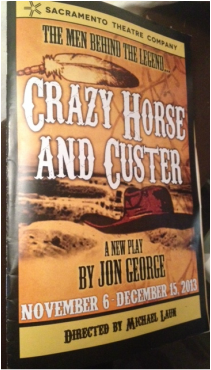 I have a lot to say, but, it all feels so… repetitive. I want to begin with “Again?” Again we are confronted with a problematic play that is not only problematic because it is patronizing, disrespectful, degrading and dismissive of Native people, but also because it’s just, actually, not well written. So the play is about “Crazy Horse and Custer”, if you couldn't tell from the title. It’s a two man show. It’s a character sketch. It’s an opportunity to have these two historical figures come together to talk about who they are, their lives, where they came from, what happened, and of course the Battle of Little Big Horn. Each of them gets to give lengthy monologues that tell the stories of their life. Through these stories each of them inhabits other characters, often adopting funny voices or stances to denote another person speaking. I’m sure some people might find it interesting, but I could barely get past Crazy Horse’s exceptionally greasy hair, an hour of Indian monologue about Elks and uh…. something, love? There was a girl in there somewhere. Somebody rode a horse and Crazy Horse figured out that Indian spirituality was bunk and then somebody thought he was powerful and then he got shot and that hurt and then he went and led the charge against Custer and a bunch of soldiers died. Or something. During much of this portion of the play I sort of… tuned out. It’s not that Crazy Horse is a boring person. I’m sure he was quite the opposite of a boring person. It’s that the first act drags on and on. And it is done in a very mystical Indian kind of way, although Crazy Horse spends most of his time talking about why mystical Indians are not very smart and how he really doesn't buy the whole spirituality thing, he's more in to "reality." There was very little humor. It felt like I was hearing the story of an ancient Indian from a long time ago, who left out all the good parts. When we finally got to the part where Crazy Horse (along with many other Native people) mounted a successful defense against Custer (along with many other soldiers) and Custer's illegal, ill advised, attempted massacre, Crazy Horse doesn’t get to tell the story. I can’t even remember what Crazy Horse said. He didn’t elaborate on anything that happened and instead left the stage so that we could (finally) have an intermission. During intermission I read the program and author’s note. The full transcript of the authors note is included in the picture. My friends Angel Hinzo and Stephanie Lumsden were with me and we read one particular line aloud. “I think the culture of the Amerindians of the Great Plains is gone forever, and the last words you hear from Crazy Horse is their epitaph.” I cleared my throat and almost lost my eyes in the back of my head from my epic eyeroll and Angel looked over at me and said “Oh hell no” before she started miming taking off her rings and taking out her earrings. I think her instincts were right, thems fighting words. In my head I immediately flashed to the second half of the play, as re-written by the three Native women in the audience. Angel charges Custer, Custer gives up, Angel says “who’s gone forever now!” before tearing off Custer’s overly thick blonde wig. We would cheer. Everyone else might wonder, “where did these Native people come from? Aren’t they all dead and gone?” During intermission I listened to conversations going on between the mostly older crowd gathered in the lobby. “Where do you think they got all of their information about Crazy Horse?” “Do you think this historical information is mostly oral history?” “It must have been hard to keep all those facts straight.” And I almost interrupted and said “Excuse me, you mean this fake, imaginary, “entertainment” “fictive” version of Crazy Horse. To quote the author’s patronizing, and frankly rude, note -- “What I have written here is neither myth nor is it history – which when studied closely is not at all unlike myth- it is a play, an entertainment, and by its very nature fictive. So, please! No slings or arrows from impassioned advocates of both the historical and mythic Crazy Horse and Custer, and no quibbles over events that, while often based on the records, I have consciously reconstructed to fit the needs of my fancy.” Excuse me? Oh hell no. That’s the second Native woman of the night who started taking off her earrings and preparing for battle. Instead I went back into the theatre and prepared for the second half of the play. In the second half of the play we hear from Custer and he’s, just a dude, who thought he was awesome, who wasn’t awesome. (The actor was pretty good though) He, like Crazy Horse, mentions nothing about Native American people and genocide. He mostly tells us about his awesomeness and, wait for it, how he coulda been President. When we got to the part where he declares: “I would have lead this great nation to become even greater” and “I was the best man” and “I would have been President” I had to keep myself from yelling out “uh huh, sure dude, you would have been PRESIDENT.” Custer wasn't my problem in this play. Crazy Horse wasn't the problem in this play. The writing was a problem. Having Crazy Horse call Custer a “compelling man” (UGH) and not a “psychotic, homicidal, genocide inflicting war criminal" who, would he have survived to become President (because, yeah, yeah, Custer, you would have been President, blah, blah, blah) would have continued his reign of terror against Native people, just because – he’s an asshole, that’s a problem. And an even more significant problem is that we go through two acts of this play and there is very little, if any (I can’t think of any) mention of the genocide of Native peoples. We hear from the beginning about the mutilation of white soldiers at Little Big Horn by Lakota people, but nothing about the murdering, raping, torturing, starving, war against Indian peoples. Custer was a war criminal. He wasn't even supposed to be at the Battle of Little Big Horn. They told him NOT to attack. He disobeyed direct orders. He committed a war crime. He wanted to kill Indian people more than he wanted to stay alive. He had already massacred Indian people before that. He killed women and children and elders. He did it with no remorse. This was not a jovial, funny, off the cuff, fringe wearing, Johnny-Depp, Jack Sparrow, drunk Uncle. This was a psychotic masochist who enjoyed killing people. And when he came on that stage my friend Angel, shuddered. Here came this “fictive” version of this man who died “a long time ago” and she cringed. And then Crazy Horse called him a "compelling man." UGH. The truth is I am having a hard time because I can’t figure out why these are the stories that play houses, and community theatres, and educational institutions want to support. Writing this kind of review isn't divorced from my emotions. I’m “offended” but, it’s more than that. I feel that heavy burden that comes from pushing against the great weight of history – or the continued attempts to negate, erase, belittle and speak for us. And I want to shout it (which just means write IN ALL CAPITAL LETTERS) but sometimes I feel like, they won’t listen. So of course I rely on Vine Deloria, Jr. who reminds us that “Custer Died for Your Sins” The most popular and enduring subject of Indian humor is, of course, General Custer. There are probably more jokes about Custer and the Indians than there were participants in the battle. All tribes, even those thousands of miles from Montana, feel a sense of accomplishment when thinking of Custer. Custer binds together implacable foes because he represented the Ugly American of the last century and he got what was coming to him (148). 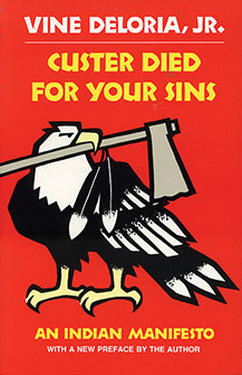 I suppose the one thing I can’t get out of my head, that thing I woke up the next day repeating was the last line of the play. At the very end of the play Crazy Horse is left on stage alone and he pulls back a curtain to reveal the Pine Ridge Reservation, supposedly, maybe, the “modern” Pine Ridge - a trash filled, barren, wasteland. Crazy Horse cries. He says “The Lakota have nothing.” He calls this place the “pitiful remnants” with pennilessness, depression, and “despair of an empty life.” And he says “The Lakota are finally defeated.” Before he turns his back on us and mutters. “It is better to be dead.” It is better to be dead. Did this play, did this author, did Crazy Horse just tell me, a living, breathing, singing, dancing, loving, laughing, joking, mothering Native woman that it is better to be dead than the Native person that I am? Did Crazy Horse just tell me, he would rather be dead, than to be a part of the living, breathing, singing, dancing, loving, laughing, joking, mothering, fathering, grandparenting, Lakota people? It is better to be dead. I left the theatre flabbergasted and… pissed. THIS is what passes as art? THIS is what people call material to “enrich, engage, educate, inspire and entertain” (that’s from the message from the Executive Producing Director in the program BTW). It is better to be dead than to be an Indian? But then something came to me clearly as I walked out into the cold night air. Maybe I think the playwright is somewhat correct. Those great Indians of yore, you know the ones who ride horses and have long flowing hair and fight epic battles with tomahawks and adopt white people who then become the last of their tribe? Those Indians are dead and gone. Those Indians are never returning. Because those Indians only existed in the imagination of Hollywood who created that Indian to make light of the reality of Native people. We were never fading away into the sunset. We were never destined for defeat. . He’s right. It is better for THOSE Indians to be dead. It is better for HIS Crazy Horse… to be dead. It is time to tell a new story. The story of this play has already been told. We have already mourned the loss of the noble savage, the last of the Mohicans, the last of the tribe. Let those Indians turn their backs to us and walk into the sunset. And then we will sing. We will dance. We will laugh. We will tell you an even greater story. Crazy Horse will probably be there. He will sit down with us and join in and he will not say to us "it is better to be dead." He will say “It is better to not spend two hours watching this play.” We will laugh. We will be laughing long into the night. More Info and Articles:
6 Comments
brian
11/9/2013 04:39:49 am
see the actor's twitter posts ..... twitter.com/louleo ... says he went to pine ridge to talk to people about play. also a link to an article in Indian country today
Reply
Joe
11/9/2013 07:29:38 am
Thanks for posting this. I'm surprised you stayed for the whole thing. You are stronger than me. I would have had to fight really hard not to vocalize my feelings.
Reply
Gary Phillips
11/9/2013 08:04:23 am
I read Stephen E. Ambrose's CUSTER & CRAZY HORSE back in the early 80's. I am full-blooded Ho-Chunk and have been interested in the Battle of Little Bighorn or Greasy Grass since I first visited the site of the historic battle in the 60's. Subsequent research has revealed much since the early days of the Park, but much remains unknown INCLUDING motive, regardless of what ANYONE tries to sell or propogate. Why is the Native so incensed when it was HE that won the battle? Because it WAS a battle, NOT a treatise on the treatment of Native Americans by the U.S. government. I did not know Custer's exploits and military career prior during the Civil War. Custer was near the bottom of his Class at West Point, so he was NOT a tactician in the mold of a Robert E. Lee or Napoleon. He was a brash, arrogant line officer in the likes of Stonewall Jackson and the hero of the Shenadoah, General Jubla.
Reply
11/10/2013 07:50:56 am
Thank you for your comments of this horrible play. It is so very sad that ridiculous ignorance like this play is out there in the world as a view of our beautiful Native peoples. Thank you for sitting through that torture and giving us a strong voice and opinion about this wrong being done to Natives in Sacramento.
Reply
maura
11/10/2013 02:20:50 pm
YES, i love your ending, LOVE LOVE LOVE IT!
Reply
"In my head I immediately flashed to the second half of the play, as re-written by the three Native women in the audience. Angel charges Custer, Custer gives up, Angel says “who’s gone forever now!” before tearing off Custer’s overly thick blonde wig.
Reply
Your comment will be posted after it is approved.
Leave a Reply. |
SubscribeClick to
AuthorCutcha Risling Baldy is an Associate Professor and Department Chair of Native American Studies at Humboldt State University. She received her PhD in Native American Studies from the University of California, Davis. She is also a writer, mother, volunteer Executive Director for the Native Women's Collective and is currently re-watching My Name is Earl... (5) Top PostsOn telling Native people to just "get over it" or why I teach about the Walking Dead in my Native Studies classes... *Spoiler Alert!*
Hokay -- In which I lead a presentation on what happens when you Google "Native American Women" and critically analyze the images or "Hupas be like dang where'd you get that dentalium cape girl? Showing off all your money! PS: Suck it Victorias Secret"
In which we establish that there was a genocide against Native Americans, yes there was, it was genocide, yes or this is why I teach Native Studies part 3 million
5 Reasons I Wear "Indian" Jewelry or Hupas...we been bling-blingin' since Year 1
Pope Francis decides to make Father Junipero Serra a saint or In Which I Tell Pope Francis he needs to take a Native Studies class like stat
I need to read more Native blogs!A few that I read...
Archives
June 2020
Categories
All
|
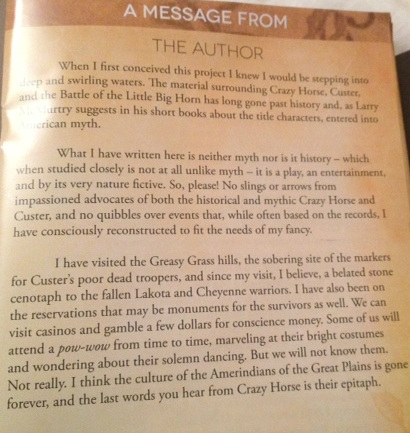

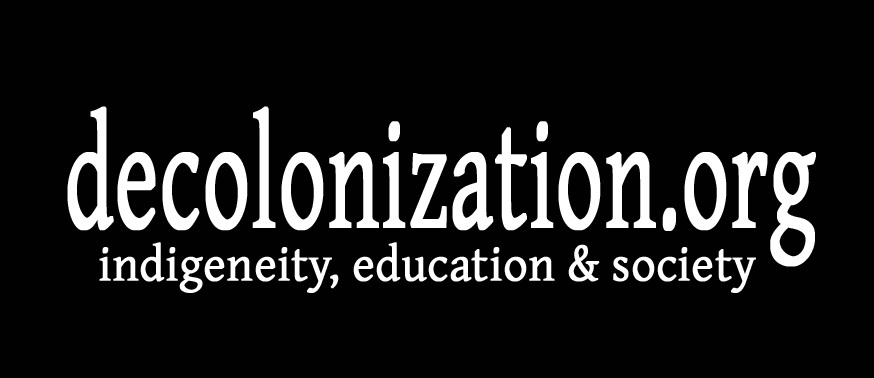


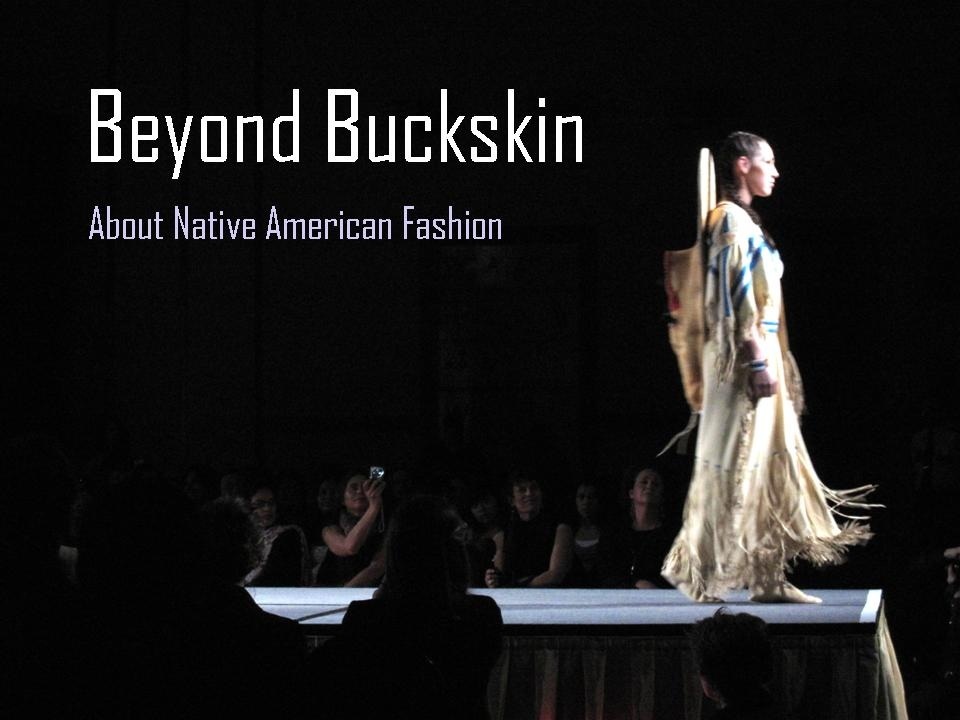

 RSS Feed
RSS Feed
